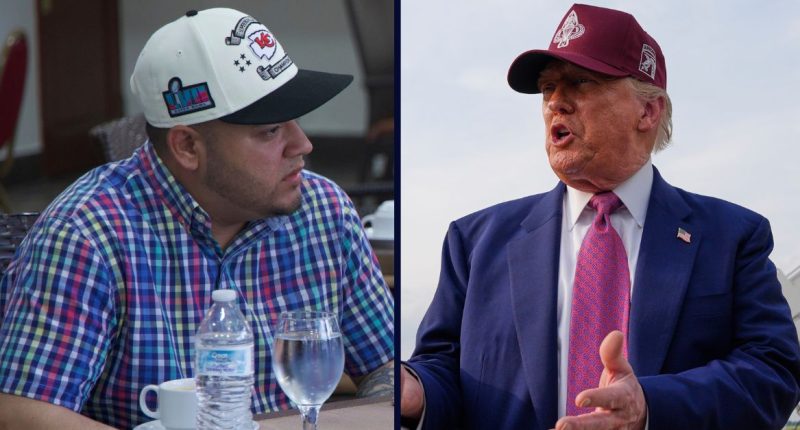Share this @internewscast.com
Left: Kilmar Abrego Garcia, a Salvadoran native residing in Maryland, was deported to El Salvador by the Trump administration and is seen speaking in a hotel restaurant in San Salvador, El Salvador, Thursday, April 17, 2025. (Press Office Sen. Van Hollen, via AP). Right: President Donald Trump addresses reporters upon arrival on Air Force One, Tuesday, June 10, 2025, at Joint Base Andrews, Md. (AP Photo/Alex Brandon)
The Trump administration urged a federal judge in Maryland to dismiss the prominent lawsuit on Kilmar Abrego Garcia’s behalf, maintaining that the government had fully complied with the court’s directive to “facilitate” Abrego Garcia’s return to the U.S. following his deportation to the infamous CECOT terrorist prison in El Salvador, attributed to an “administrative error.”
On Monday, the Justice Department officially moved to dismiss the case, claiming mootness, as Abrego Garcia’s current presence in the U.S. signifies that the main issue at hand has been addressed.
“Plaintiffs have now received the relief they sought in their Complaint because Defendants have taken extraordinary steps and have facilitated, and indeed effectuated, Abrego Garcia’s return to the United States,” the eight-page motion says. “Because Plaintiffs have received the complete relief they requested in the Complaint, this Court ‘no longer has effective relief to offer.’ Therefore, ‘there is no longer a live controversy,’ and Plaintiffs’ claims are moot. Since mootness goes to the heart of the Article III jurisdiction of the courts, this Court must dismiss Plaintiffs’ claims.”
Love true crime? Sign up for our newsletter, The Law&Crime Docket, to get the latest real-life crime stories delivered right to your inbox.
Abrego Garcia’s sudden return came after months of legal disagreements and public feuding between lawmakers, administration officials, lawyers, and judges over his deportation, which the administration has admitted on numerous occasions was due to an “administrative error.” The matter was further complicated when Abrego Garcia was indicted on two federal criminal charges for allegedly transporting undocumented migrants within the country, charges he has denied.
According to the DOJ, because the case is moot, the expedited discovery ordered by U.S. District Judge Paula Xinis “serves no purpose.” The discovery would uncover what steps the administration took to comply with orders from her, an appellate court panel, and the U.S. Supreme Court regarding the efforts to have Abrego Garcia returned from El Salvador.
“Defendants no longer need discovery to reveal whether Defendants are complying with the Court’s preliminary injunction,” the DOJ asserted.
Attorneys for Abrego Garcia have already made clear that they believe the case should continue and are seeking sanctions against the administration for its alleged “defiance” of court orders since his unlawful deportation in March 2025 or the appointment of a special master to investigate the extent of the alleged noncompliance.
The attorneys last week excoriated the federal government for “delays and obfuscation” in the case, arguing that the administration “did not just refuse to obey the Court’s orders, but willfully sought to impede the discovery process.” Allowing such conduct to go unpunished would set a dangerous precedent for future cases, the attorneys argued.
“The Government’s defiance has not been subtle. It has been vocal and sustained and flagrant,” Abrego Garcia’s attorneys wrote in a filing last week. “The Defendants’ defiance of judicial orders has been accompanied by misrepresentations, stonewalling, and even questioning of this Court’s authority. The Defendants’ defiance of this Court’s discovery orders, in particular, has been egregious, defined by open refusal to produce any evidence of its professed compliance and the meritless assertion of an array of purported privileges to shield its actions from scrutiny.”
The DOJ has referred to the accusations from Abrego Garcia’s camp as “desperate and disappointing” in the face of his return stateside, claiming they’ve been “baselessly” maligned by his counsel for allegedly flouting court orders, “when just the opposite is true.”
Such sentiments are seemingly at odds with the facts and history of the case, as the administration has repeatedly been harangued by Xinis for allegedly ignoring orders from her, stonewalling, and appearing to intentionally “misconstrue the Supreme Court’s order” requiring officials to “facilitate” the return of Abrego Garcia months ago.
The administration also suggested that its supposed “good faith compliance” with the courts’ orders could be due to its “inability to share state secrets and other protected material” while diplomatic discussions with El Salvador were ongoing.
Again, those claims seem to fly in the face of the administration’s position in the case up until recently, as well as defiant statements from President Donald Trump and multiple high-level administration officials who stated that Abrego Garcia would never step foot on U.S. soil again.
















